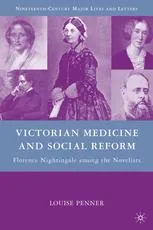Victorian Medicine and Social Reform: Florence Nightingale among the Novelists
4.3
Reviews from our users

You Can Ask your questions from this book's AI after Login
Each download or ask from book AI costs 2 points. To earn more free points, please visit the Points Guide Page and complete some valuable actions.Related Refrences:
Introduction to "Victorian Medicine and Social Reform: Florence Nightingale among the Novelists"
"Victorian Medicine and Social Reform: Florence Nightingale among the Novelists" is an insightful exploration of the intersection between literature, medical practices, and social reforms in the Victorian era, centered around the transformative impact of Florence Nightingale. Authored by Louise Penner, this book provides a comprehensive understanding of how Nightingale's revolutionary ideas were mirrored and amplified by contemporary novelists.
Detailed Summary of the Book
The book meticulously delves into the pivotal era of Victorian society, where medical innovation and social reform were dynamically at play. Florence Nightingale, known as the 'Lady with the Lamp,' emerges as a central figure who not only redefined nursing but also inspired a wave of social and literary reflections. The book examines the significant role that literature played in portraying and responding to the societal changes prompted by Nightingale's work.
Through detailed analyses, Penner illuminates how novelists such as Charles Dickens, Elizabeth Gaskell, and George Eliot echoed Nightingale's calls for reform within their narratives. These authors used their novels to critique the state of medical institutions, highlight public health issues, and advocate for improved social conditions. By doing so, they created a rich tapestry of reflection and action that resonated deeply with Victorian readers.
Key Takeaways
1. The Power of Literature in Social Reform: The book illustrates how literature can serve as a catalyst for social change by bringing critical issues to the forefront of public consciousness.
2. Nightingale's Lasting Impact: Beyond her contributions to nursing, Nightingale's influence extended to the broader social reform movement, affecting public policy and culture.
3. Interconnection of Disciplines: The text highlights the synergy between the medical field, literature, and social policy during a transformative period in history.
4. Understanding Victorian Society: The novelists' portrayal of societal challenges provides contemporary readers with a nuanced understanding of Victorian life and its complexities.
Famous Quotes from the Book
"Florence Nightingale's influence extended far beyond the confines of the hospital wards, reaching deep into the realms of literature and societal consciousness." - Chapter 2
"The novel becomes a potent vehicle for social commentary, reshaping the narrative of health and healing." - Chapter 4
Why This Book Matters
In an era where the connections between disciplines often go overlooked, "Victorian Medicine and Social Reform" serves as a compelling reminder of the power of interdisciplinary approaches. By situating Florence Nightingale within the sphere of contemporary literature, Penner provides readers with a more holistic view of her legacy. The book emphasizes how cultural artifacts, such as novels, can influence and reflect significant societal changes. It speaks to the timeless nature of these dialogues and their relevance today, as we continue to grapple with issues of health, reform, and social justice.
For scholars, students, and anyone interested in the confluence of medical history, literature, and social activism, Penner's work offers a rich, engaging, and insightful perspective.
Free Direct Download
Get Free Access to Download this and other Thousands of Books (Join Now)
For read this book you need PDF Reader Software like Foxit Reader
Accessing books through legal platforms and public libraries not only supports the rights of authors and publishers but also contributes to the sustainability of reading culture. Before downloading, please take a moment to consider these options.
Find this book on other platforms:
WorldCat helps you find books in libraries worldwide.
See ratings, reviews, and discussions on Goodreads.
Find and buy rare or used books on AbeBooks.





